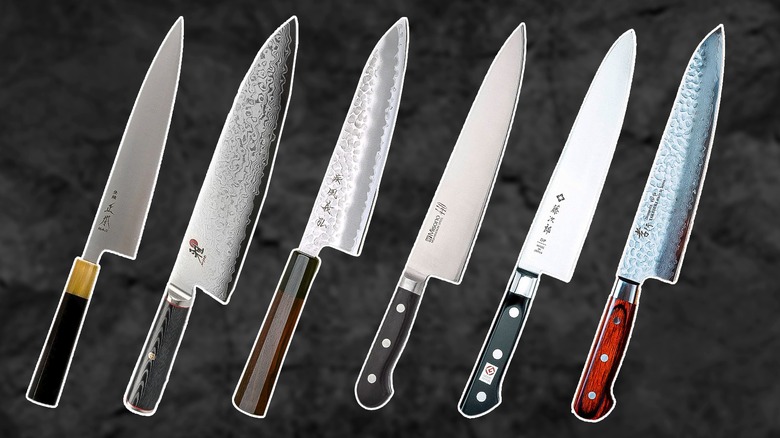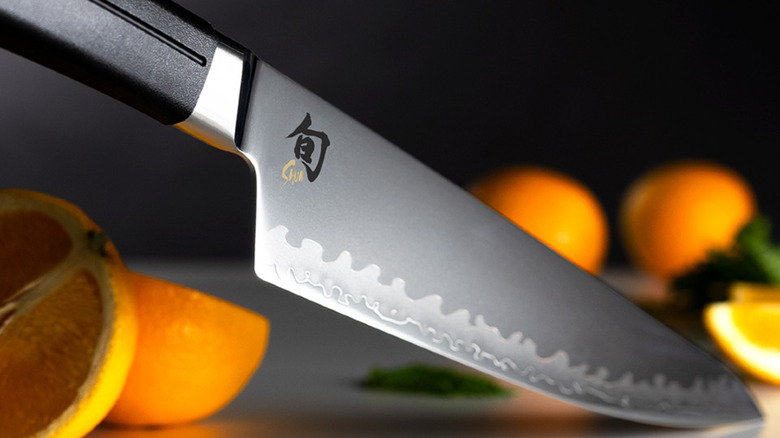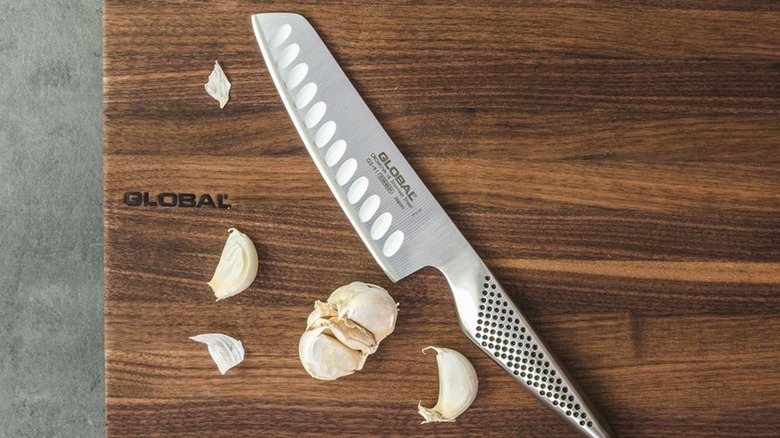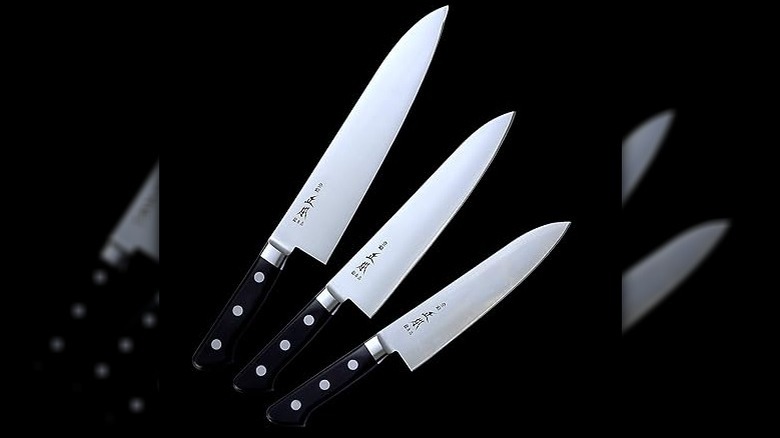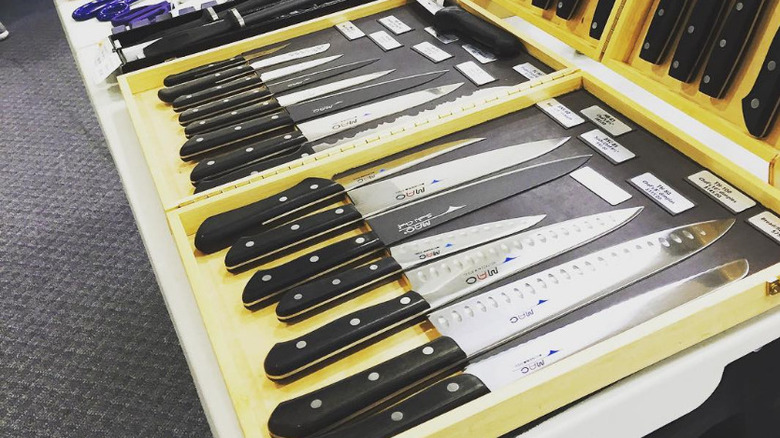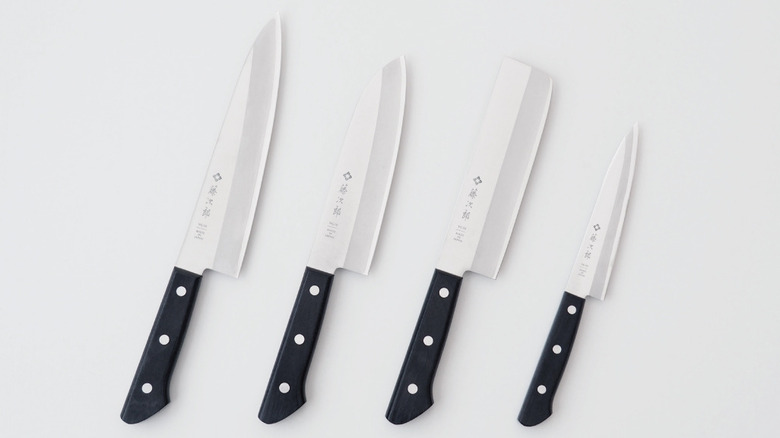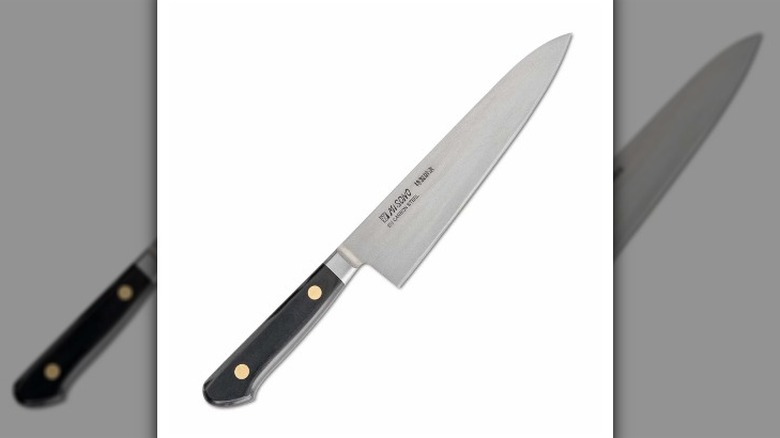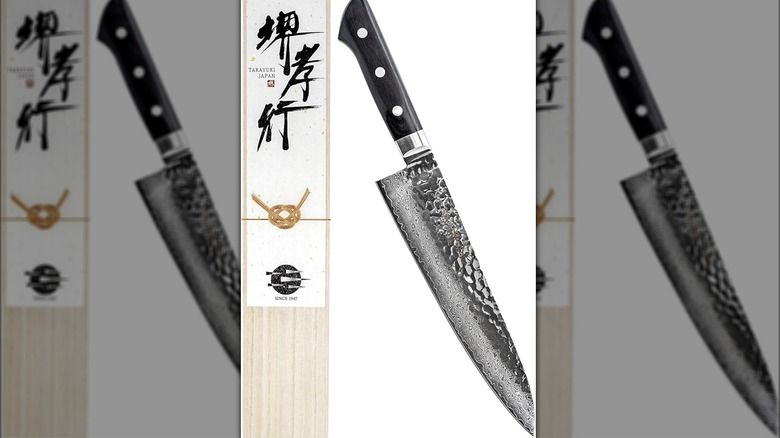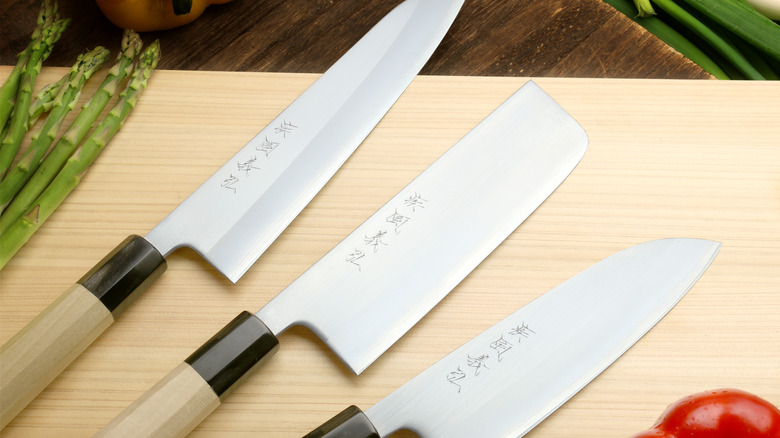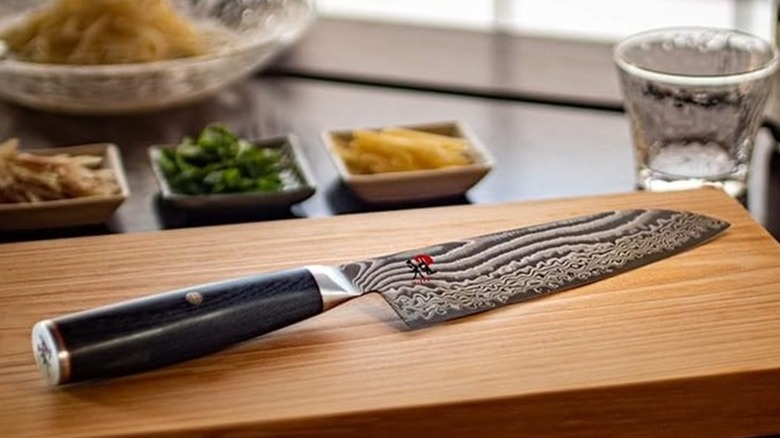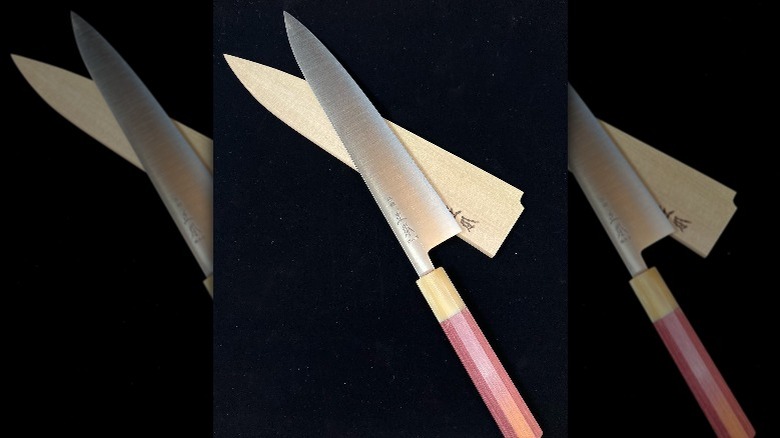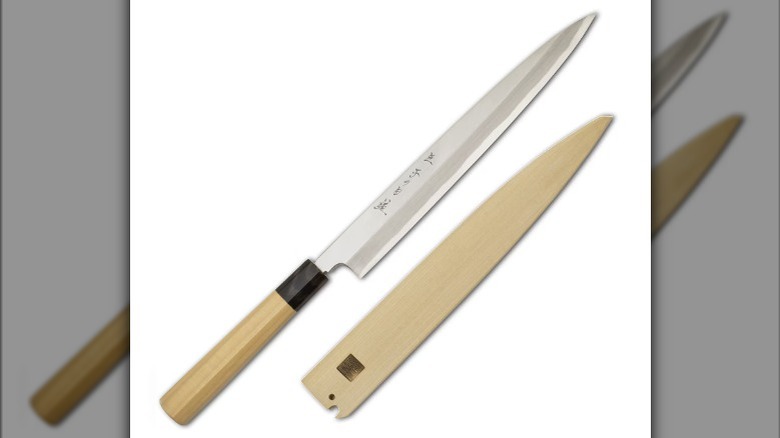12 Best Japanese Knife Brands
We may receive a commission on purchases made from links.
Every cook needs at least one good knife in their kitchen, preferably more. Most culinary creations can be enhanced with a high-quality blade, allowing you to craft the perfect dish. From chopping vegetables to deboning duck to filleting fish, various types of knives enable home cooks and professional chefs to orchestrate a number of recipes that require proper tools and technique. Japanese knives are specialized knives known for their sharpness and precision, as well as craftsmanship, which is often compared to a skilled art.
We consulted with Chef Goku, owner and operator of The Chef Dojo, and Michael Behn, owner of Moshi Moshi Knife Sharpening, to help us determine the best Japanese knife brands for your kitchen, what makes them special, and why you may want them. First and foremost, Goku tells us, the optimal knife for your kitchen depends on its purpose and the task it's most suitable for. Once you've determined that, sharpness, edge retention, and durability of the blade are other major factors to consider.
Behn feels the most important part of finding the right knife is the blade and the sharpening that shapes it. "Sharpness is the main factor for enjoying any knife," he says. "How it's ground is very important, as well; you want something nice and thin behind the edge."
Shun
Shun is Japanese cutlery with Western flair, and it's a favorite of many professional chefs, including Andrew Zimmern and Bobby Flay. The brand's name refers to the peak of perfection, and Shun's wide range of knives available are handcrafted using more than 100 steps of fine-tuning for each piece. This award-winning brand offers cooks multiple blade styles, whether you need an everyday chef's, boning, or paring knife, and all are made from high-carbon or Damascus steel.
According to Chef Goku, this high-grade steel offers a better cutting experience but may be more brittle than a lower-grade steel like stainless. While it also requires more care to maintain the integrity of the knife, it still makes up some of the most durable Japanese knives on this list.
Ranked high among all knife brands, as well as making one of the best kitchen knife sets around, Shun's various individual knives and collections offer different benefits depending on the knife's purpose. Both Goku and Michael Behn recommend starting with the three most versatile Japanese knives: gyuto, petty, and santoku. But Behn stresses, "Go with what you think will inspire you to cook more and is something you can cherish for the rest of your life. These things will seriously last that long if you take proper care of them."
Global
Aiming to combine Japanese craftsmanship with Western utility, Global knives are ground to a point instead of a beveled edge. Known for their long cutting edge, Global knives feature double-edged blades and longer handles to ensure the weight of the knife is perfectly balanced for easier handling and more precise control over your cuts. Unlike Shun's cutlery, these blades are made of stainless steel, which Chef Goku tells us is a more practical choice for everyday use and easier to maintain.
Setting itself apart from most other Japanese knives, the handles of Global knives feature a more Western style and are stainless steel, as well — rather than wood or wa, the traditional Japanese style. Whether this is a good option for you is a matter of personal preference, both Goku and Michael Behn tell us. "You want something that is comfortable to hold," says Goku. "You probably want to consider the material (wood or synthetic) and durability. Traditional Japanese knives like yanagiba tend to have traditional-style handles (wooden cylindrical style), while modern knives like gyuto have Western-style grip shaped handles."
Masamoto
Masamoto knives have been around since 1866 and feature a double-beveled edge, which is convenient for left- and right-handed cooks. Though the edge is sharpened with a 70:30 ratio (suitable for right-handers), a ratio which Michael Behn tells us is super sharp and easy to maintain, left-handers can sharpen the back of the blade to adjust Masamoto knives to their personal needs. There's a variety of collections to choose from — some bolster Western-style handles and others feature the traditional wa handle, made from either magnolia wood or water buffalo horn.
With blades made from carbon and Damascus steel, these knives are sought after for their sharpness and ability to hold an edge. Japanese knives like Masamoto are tempered to reach a hardness scale of about 60, which is considered moderately hard. The hardness scale, indicated as HRC, refers to the Rockwell hardness on the C scale — a measurement that determines just how hard the steel blade is; the higher the number, the harder the blade. Chef Goku tells us the harder steel allows the blade to retain a sharper edge but may also be more brittle. Because of the higher-quality steel, these knives need more maintenance and care, such as requiring handwashing to avoid rusting.
Masamoto offers knives with a slightly lower or higher HRC, depending on your knife needs. For instance, its gyuto chef's knife has an HRC of 57, which Goku points out is often better for beginners because the softer stainless steel is easier to sharpen and maintain and is less likely to chip. More specialized knives with an HRC of 62 to 64 are geared toward advanced cooks — such as petty, which is a small knife suitable for delicate tasks; yanagiba knives made for sushi; and usuba, which is designed to cut vegetables.
Mac
Mac offers a wide range of knives, but its Japanese series are made strictly in Japan with Japanese materials. As Chef Goku tells us, "When choosing a Japanese knife, look for brands [or] blacksmiths that have a long-standing reputation, and that actually make their knives in Japan." These culinary knives are hand-forged by experienced craftsmen in Sakai, the knife capital of the world, and feature a hybrid blade with various steel strengths. The blade is a cross between the Japanese single-beveled edge and Western V-shaped edge, which creates a versatile kitchen knife for cutting, chopping, and slicing. Though Japanese knives are sharper, thinner, and lighter than Western knives, the Mac series claims to have a super-fine, super-sharp edge that rivals its competitors.
Depending on the series you choose, Mac knives are outfitted with magnolia wood, ebony, or pakkawood handles that feature buffalo horn caps. And while most Japanese knives require special care to keep them from chipping, as mentioned, Mac also offers knives made with molybdenum and sub-zero steel, which need less maintenance than the higher-quality white steel.
Tojiro
Tojiro forges every piece of its cutlery, transforming steel into high-end culinary knives, such as gyuto, nakiri, santoku, and usuba — all of which the brand claims to be "once in a lifetime" knives. Striving to be more than just the sharpest type of knife, Tojiro's goal is to also create knives that are more comfortable to hold so they're enjoyable to use. After all, if you're looking for your next kitchen knife, you want one that fits your hand, so it acts like an extension of your arm.
Tojiro is among the brands that Chef Goku recommends for beginners, especially since its products are easy to find. "The lightness also makes the knife more nimble and easier (i.e. less tiring) to use over long periods of time," he says of Japanese knives in general.
Combining traditional and modern technology, Tojiro creates a variety of handcrafted knives in a range of blades, handles, and steel hardness. The knives are manufactured in the same way as a traditional Japanese sword is: using clad steel. Steel quality ranges from stainless to white to Damascus, and handles range from traditional octagonal magnolia wood to D-shaped stainless steel to curved and laminated. Tojiro knives are made for maximum cutting performance, which is one of the qualities that has helped the company to win awards for knife excellence.
Misono
Misono began in 1935 making simple vegetable peelers. Remaining as a family-owned business, the company started making kitchen knives a few decades later. Different than the majority of Japanese knife brands on our list, Misono manufactures Western-style knives but follows a process similar to traditional Japanese knives. Though Chef Goku says, "Certain brands are meant for at-home cooks and others are mainly meant for professional kitchens," he feels Misono is among the brands that are good for beginners and more advanced chefs alike because of its long history and excellent reputation.
Misono knives are crafted mostly by hand using hard steel where every single piece in its collections is made in one location: no outsourcing here. All knives are finished with sharpening by hand. They then go through a rigorous inspection to ensure premium edge retention. Misono offers knives with a 70:30 beveled-edge ratio, but you can request knives to be sharpened for left-handed use. Steel quality ranges from 57 to 60 on the hardness scale using molybdenum steel or Swedish carbon steel, which is said to be one of the purest forms of carbon steel.
This type of knife requires special care and handwashing in order to maintain the handcrafted knife's integrity. This will help keep it in top shape for all your culinary needs.
Sakai Takayuki
Sakai Takayuki boasts more than 600 years of stellar cutlery history. Sakai knives are steeped in cultural tradition and are said to be made by the most-skilled Japanese craftsmen. The knives are forged using high-carbon or Damascus steel and hand-sharpened with the Honbazuke method, which culminates into a sharp, precise, and durable blade. This well-known sharpening technique is completed in three phases: vertical sharpening that creates the edge of the knife, honing the edge to establish the blade's angle, and polishing to gain the sharpest finished edge.
Creating a sought-after culinary knife, Sakai Takayuki offers a variety of blade types, from gyuto to petty and usuba to sashimi. Its Damascus blades are hand-forged in layers, fusing art and function to give you knives that not only cut with precision but look sharp, as well — which, as Michael Behn relays, is another reason why chefs love Japanese knives, and why they're worth the typically higher price tag. "I would say, when picking your knife ... it's something to invest in," Behn tells us. "When you are using the same beautiful sharp Japanese knife in 20 years with 20 more years ahead of the initial investment, [the price] won't seem bad at all."
Yoshihiro
Yoshihiro offers hundreds of handcrafted knives across various collections, including kitchen knives. With more than 100 years of knife-making history, Yoshihiro uses centuries-old techniques that have long been used for crafting swords in order to make its culinary knives. Another Japanese cutlery business that has the philosophy of manufacturing what it dubs "once in a lifetime" knives, we previously ranked this knife brand as a great choice for your kitchen knife because they're durable and easy to handle, while also looking stylish in your kitchen.
The Yoshihiro brand has multiple blade and handle options available, including single- and double-edged blades that are made from stainless, carbon, or Damascus steel that registers around 60 on the Rockwell hardness scale. You'll find knives with the traditional octagonal-shaped handle, as well as the Western-style handle. Handle material is quite varied and includes magnolia, rosewood, mahogany, ambrosia, and pakkawood, which is a combination of engineered wood and resin.
Miyabi
A favorite of both Iron Chef Masaharu Morimoto (though he has his own personal knife brand through Miyabi) and Gordon Ramsay, Miyabi Japanese knives are crafted with tradition and designed with Japanese techniques. Interestingly, Miyabi is owned by the German company Zwilling, but the Miyabi knives are primarily manufactured in the city of Seki, Japan, which is known for its sword making. Bringing the two worlds together, Miyabi combines Japanese craftsmanship with German engineering to come up with its line of culinary knives.
Miyabi offers various series of knives from elegant to modern in a range of steel, including stainless and Damascus, and handles like birchwood and pakkawood. Different than other knife brands on our list, Miyabi uses a process called ice-hardening to increase the strength and resilience of the blade. The process requires cooling the blade to -196 degrees Celsius in liquid nitrogen after it goes through the Honbazuke method to create a precise blade angle.
Enso Forge
Enso Forge features what we think might be some of the most unique Japanese knives on our list. Its knife options are also definitely more on the pricey side, but each piece is custom made and handcrafted, which we feel can bring to your kitchen a piece of functional art. "Shape and design are also factors," Michael Behn says about Japanese knives, explaining, "The shape [of a Japanese knife] is generally loved by those that cook, they just feel sharp and look sharp, too." But he also points out that, just because a knife looks cool, you'll want to be sure you're going to actually use it.
Offering multiple types of knives, Enso Forge knives are made from high-carbon steel while some are available as multi-layered Damascus. The heat treatment each knife goes through is similar to sword making, where the heat creates a hamon (a visible effect) that is unique to each blade after treatment and polishing. The handles of the knives are just as unique as the blades, available in materials such as walnut, snakewood, and ebony. Another handle type is made from an ancient mammoth molar, which is stabilized, dyed, and then sculpted for the finished product.
Each knife is meticulously handmade with premium materials. With the heavier price tag and supreme attention to detail, this brand is a better option for those who are really serious about their knives.
Korin
Korin actually sells multiple Japanese knife brands online and in its Manhattan location, but the company also carries its own brand of Japanese knives. Unlike the majority of knife brands on our list, Korin only began about 40 years ago. The wide selection of knives offered are handmade by artisans familiar with traditional Japanese techniques and have been evaluated by the founder and another master knife maker to ensure the highest quality.
Korin offers various steel blades, including Damascus and hammered Damascus, that feature layers of steel with a hardness scale of 60 to 61 — which, as mentioned, is a good hard steel and quality that chefs look for, according to Michael Behn. These knives have a 50:50 double-beveled edge ratio, making them a suitable choice for left- and right-handed cooks. But there's also an 80:20 beveled edge ratio knife with a hardness scale of 58 available. Handle designs include a colorful mahogany, burgundy wood, and Micarta, which is a durable material made from synthetics.
Nenohi
Nenohi is a second-generation cutlery company that makes its Japanese knives in Japan. Sometimes confused with or referred to as the brand Nenox, Nenohi is the brand specific to the Japanese knife collection while Nenox is the brand for Western-style kitchen knives. Beginning in 1975, both Nenox and Nenohi cutlery have been manufactured by skilled craftsmen using traditional Japanese methods and techniques that were used to make Japanese swords. Michael Behn lists them among nice Japanese knife brands.
Nenohi knives are made with high-quality white or blue carbon steel with a hardness factor of 60 to 62 on the Rockwell scale. This type of knife is the kind some more experienced chefs would choose, Chef Goku says, since this type of high-carbon steel blade offers better cutting performance. The blades are hand-forged, ground, and then hand-sharpened. The variety of knives offered feature the traditional octagonal handle made out of magnolia wood and are outfitted with water buffalo horn bolsters. And since the bolsters are made from the natural horn, the color may vary, giving the knife a more individualized look.
